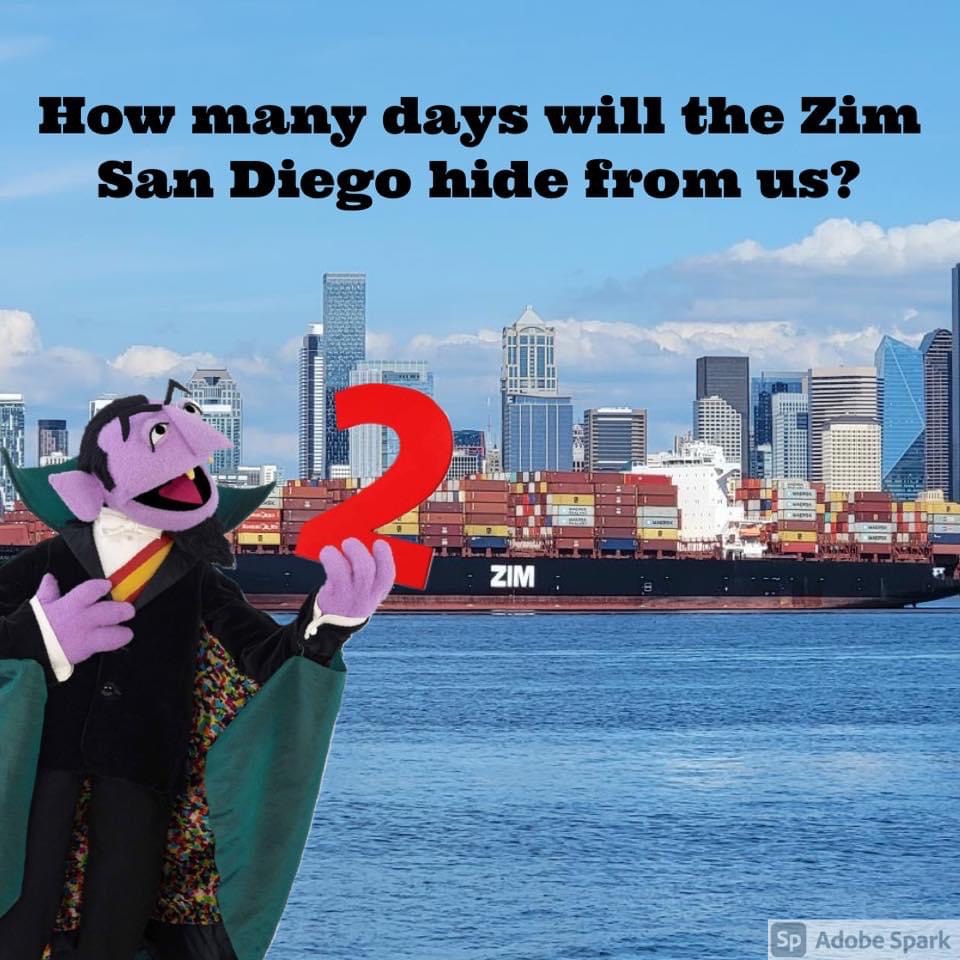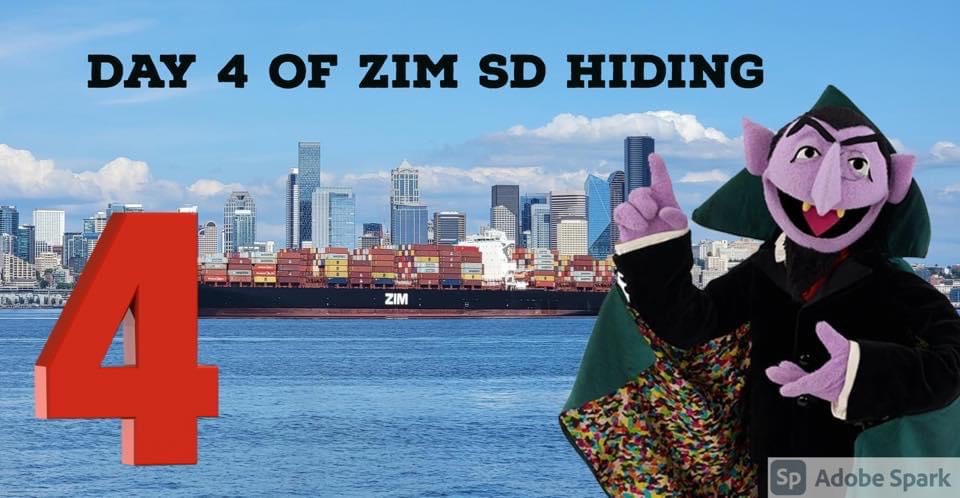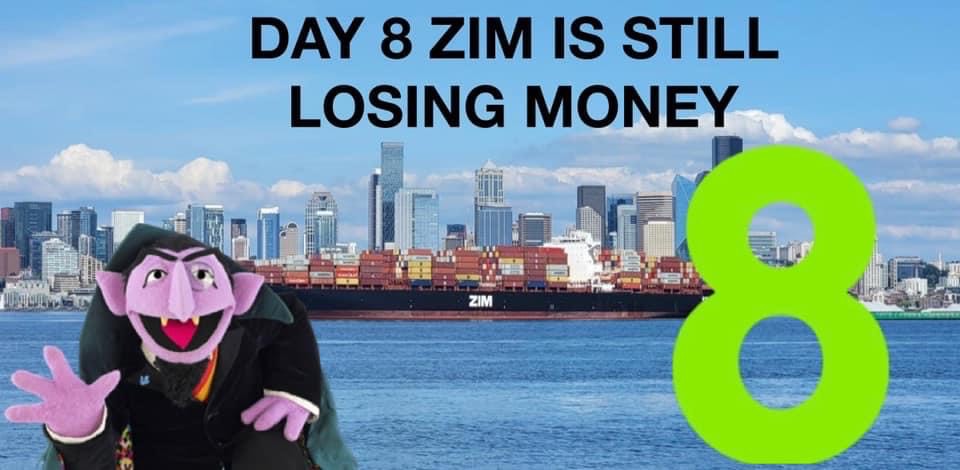#BlockTheBoat Seattle
An interview with Falastiniyat’s Ranna Harb and Izzy Halaka

Tempest: You helped organize a blockade of a freighter operated by the Israeli shipping company ZIM at the Port of Seattle last month, creating a substantial delay for operation of the ship. Can you talk about that action and how it relates to the larger #BlockTheBoat campaign?
Falastiniyat: The #BlockTheBoat campaign originally started in 2014 with the Arab Resource and Organizing Center [in the San Francisco Bay Area] as a solidarity movement with the Palestine General Federation of Trade Unions. #BlockTheBoat is an international campaign that calls on the world to stop utilizing the largest and oldest Israeli shipping company, ZIM (Zim Integrated Shipping Services, Ltd.). ZIM deals in Israeli-manufactured military technology and arms, as well as consumer goods. These efforts were massively successful toward the goals of the Boycott, Divestment, and Sanctions (BDS) movement, which calls for a social and economic boycott of Israeli goods, divestment from Israeli companies, and sanctions on Israel.
In Seattle [this June], Falastiniyat was able to block the ZIM San Diego [container ship] from docking for ten days and delayed it from being unloaded for six more days once it was docked. Every day that ZIM remained delayed and unable to offload cargo at the Port of Seattle cost money, hurt relationships with companies using their services, and proved the feasibility of implementing BDS in our communities.

Tempest: The #BlocktheBoat campaign in Seattle and the victory of the complete blockage of the ZIM ship in Oakland reflect an advance from 2014, the last time there was a major war on Gaza. Back then Oakland was the only place where sizable actions against ZIM occurred. How have conditions changed for organizing for justice for Palestine and what does that mean for what kind of organizing needs to occur?
Falastiniyat:There has been an international call to recognize the oppression of Palestinians for what it is, apartheid, genocide, ethnic cleansing, and militarized occupation. Normalizing conversations and education about Palestine is equally as imperative as direct action and coalitional relationship building.
We have seen a visible change in public perception and awareness from on the ground #BlockTheBoat efforts in 2014 to on-the-ground action of Falastinyat in 2021. Our targets, purposes, and goals remained similarly linked, with the aim of bringing international awareness to the ongoing ethnic cleansing of apartheid Israel, and to stand in solidarity with Palestinian trade unions and worker organizations. They bear the burden and immediate impacts of apartheid violence and continue to be on the front lines of the struggle for collective Palestinian liberation.
Both 2014 and 2021 actions represent the need and inherent value of grassroots organizing locally, nationally, and globally. Falastiniyat has been working to build lines of solidarity within coalitional spaces like International League of Peoples’ Struggles, End the Deadly Exchange, and Palestinian Feminist Collective because we know that systems of oppression are interlinked.
The George Floyd uprisings set a precedent for showing up for local communities. Networks of radical mutual aid were built. Local organizations and community members were prepared to mobilize for one another at a moment’s notice to show that we are not alone in the fight for global liberation. The movement for freedom and justice in Palestine is part of a broader movement for liberation. Globally, people are seeing the connections between U.S.-sanctioned imperialism from the Philippines to Afghanistan, Tigray, Colombia, Palestine and the countless places around the world that are victims of sanctioned violence and colonialism.

Tempest: One interesting feature of the #BlocktheBoat campaign is that it is a fusion of struggles. International Longshore and Warehouse Union dockworkers do essentially political strikes to refuse to unload the boat but this is initiated by a picket of solidarity activists that ILWU workers are asked to not cross. In Oakland this has successfully stopped ZIM ships twice. Do you think that U.S. labor unions are strategically important for building campaigns for BDS? Why?
Falastiniyat: U.S. labor unions play a critical role in advancing the goals of BDS. More and more labor unions oppose Israeli apartheid because they see the direct impacts of settler colonial violence on working people and organized labor. The Oakland longshore workers union is a powerful example of the leverage that unions hold. This June, the ZIM Volans ship failed to dock at the Port of Oakland after protesters held a strong picket line. This was the first time since 2014 that ZIM returned to the Port of Oakland. As longshore workers honored the picket line, they also made a clear statement that the port would not do business with companies that profit from apartheid. As other unions follow suit—like workers in Prince Rupert, British Columbia, who blocked the same ZIM Volans ship that was turned away from Oakland—Israel will soon run out of places to do business.
The Seattle Education Association (SEA) Representative Assembly passed a new business item to endorse BDS and the End the Deadly Exchange campaign to stand in solidarity with Palestinians. SEA represents about 6,500 teachers and staff in Seattle Public Schools and recognizes the power they hold to shut down Israeli apartheid in classrooms and curriculums.
These are just a few examples of why labor union solidarity is crucial to Palestinian liberation and the fight against imperial powers from education to legislation and beyond.

Tempest: Massive demonstrations around the world against Israeli ethnic cleansing in Sheikh Jarrah and bombing of Gaza, actions like #BlocktheBoat, a wave of solidarity and BDS resolutions passed in U.S. trade unions, direct action in the U.K. against arms manufacturers who supply the occupation, and the Unity Intifada and general strike across historic Palestine all demonstrated a tremendous resurgence of focus and energy to fight for justice in Palestine.
However, some focus on Palestine has slightly lessened now that full-scale war on Gaza has abated even though the daily conditions of violence, occupation, and ethnic cleansing of the ongoing Nakba continue. How can we continue to build pressure and keep people talking about Palestine and organizing against Israeli apartheid?
Falastiniyat: It must be made explicitly clear that we cannot become complacent and fall into cycles of inaction when Gaza is not actively being bombed or the news coverage of militarized occupation has ceased. As people living and paying taxes in the United States, the world imperial core, we are complicit and thus are obligated to fight until liberation. Although the spark of focus on Palestine may have left the minds of many, Palestinians across the world have not stopped organizing. It is critical for allies to step up, follow the leads of Palestinian organizers within their community, and continue speaking up about Palestine in their workplace, family, and the broader community.
In Seattle, actions for Palestine are stronger than ever and there are ways for anyone and everyone to get involved. A bill to end the deadly exchange of police training and visits between the U.S. and Israel will soon be introduced in the Seattle City Council. We know that Zionists are actively working to prevent it from passing. We need to show the council that Seattle supports ending the deadly exchange.
The Seattle Educators Association (SEA) recently passed a business item to endorse BDS and end the deadly exchange but they are facing immense backlash from local Zionists. Send SEA a letter to voice support for their work and to ask them to uphold this business item.
Categories
We want to hear what you think. Contact us at editors@tempestmag.org. And if you've enjoyed what you've read, please consider donating to support our work:
DonateAlex Schmaus and brian bean View All
Alex Schmaus is a member of San Francisco Movement of Rank and File Educators, United Educators of San Francisco, the Tempest Collective, and the Democratic Socialists of America. brian bean is a socialist organizer and writer based in Chicago, a member of the Tempest Collective, a part of the Rampant Magazine editorial collective, and an editor and contributor to the book Palestine: A Socialist Introduction.
